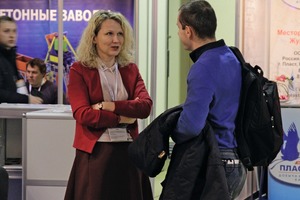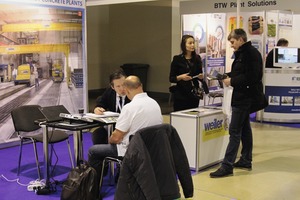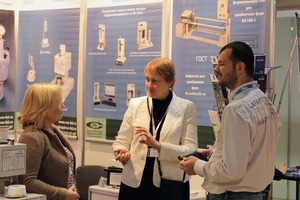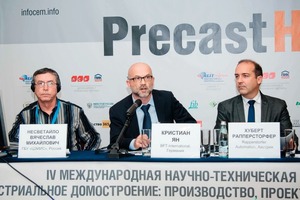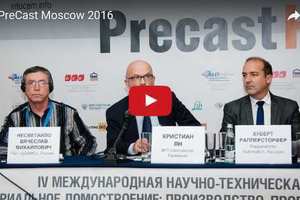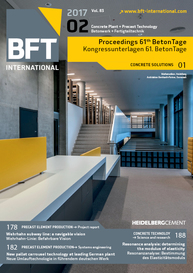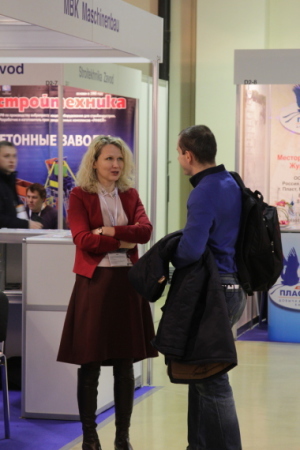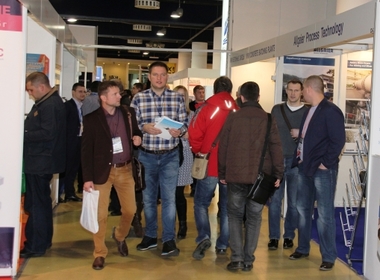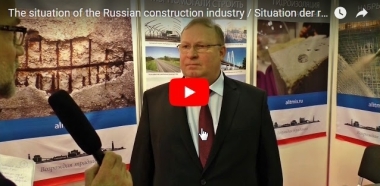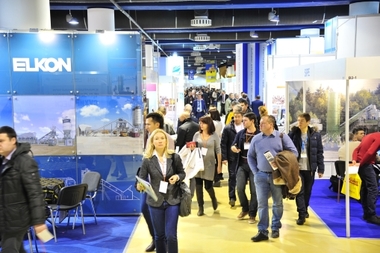Contech/Precast 2016:
Russian precast industry in crisis [Video]
Three times in the course of a single day of the trade show, the team at the BFT stand was requested to provide a link to potential investors or buyers. Two Russian concrete plants and the production of a Russian manufacturer of machines for the concrete and asphalt industry are up for sale. These encounters, which took place at this year’s ConTech/PreCast trade show and symposium, show more clearly than any abstract economic report by a business consultant or ministry where things stand for the Russian building materials industry and especially the concrete sector.
The crisis once again affects the barely existing Russian SMEs. According to the technical director of a precast producer based in Samara, it is mainly in the Russian regions far from Moscow, the economic and political capital of the giant country, that the effects of the sanctions imposed by the USA and the EU, and the protectionist countermeasures of the national government, make themselves felt. The numerous success stories told by international machine manufacturers in the recent past were not in contradiction with his statement, he said, because, if any plant technology was still being purchased at all, the state was almost always involved as an investor in these invariably large projects.
Russians only
barely fill the gap
Representatives of the international supplier companies represented in Moscow also gave a sober assessment of the economic situation. There is unanimous agreement on the best course of action: hold out, for the moment even without securing new orders, fly the flag and hope for the sanctions and crisis to end. The unfavorable exchange rates and the relatively low price of oil remain a problem.
According to mbk manageress Yevgeniya Petryashova, the requirements of producers are, for the time being, at least in part met by domestic machine manufacturers. She believes this to be more of a desperate act, however, in view of the inferior quality which the Russian buyers are quite aware of. As soon as the Russian economy recovers, the temporarily disloyal buyers will once again rely on the technology of international manufacturers.
Bucking the trend
The manufacturers of machinery and plant for the production of structural precast elements are painting a similar picture: even Moscow-based Anton Ohlert GmbH, exclusive sales partner of many international premium manufacturers including Weckenmann Anlagentechnik or Nordimpianti, has to cope with the Russian precast producers’ reluctance to buy. One of the few glimpses of light: battery molds appear to be selling quite well at the moment, according to Ohlert’s representative at the Moscow stand. They recently succeeded in supplying just under 20 Weckenmann molds to a company based in Saint Petersburg.
Another German manufacturer is currently quite successful in bucking the trend: Weiler GmbH, headquartered in Gau-Algesheim, recently supplied plant equipment to a producer in Samara on the Volga River (cf. BFT International 01/2017, p. 24-25). The deal had been initiated two years ago, and Weiler was able to complete the contract successfully despite the crisis and put the plant into service as scheduled in the summer of 2016.
Expertise is in demand
Unlike for the trade show, visitors turned out strongly again for this year’s symposium which, as usual, was held at the same time. Around 150 representatives of producers, research institutions, municipal and government administration were interested in the BFT International panel on “Current issues of precast concrete element production”.
Hubert Rapperstorfer, managing director of the company of the same name based in the Austrian municipality of Steinhaus, registered a gratifying amount of attention. In his entertaining and informative multimedia lecture, Rapperstorfer presented his award-winning invention, the so-called cage wall. For the first time, technology and plant engineering enable reinforcement cages for double walls to be produced in a fully automated process.
The successive lectures given by Jürgen Oecknick, PSA Zurich Area GmbH, and Dipl.-Ing. (FH) Michael Erhardt, managing director of Hemmerlein Ingenieurbau, caused no less of a stir. Together, they presented to the audience the knowledge and skills required for the production of exclusive architectural concrete façades with white cement.
Other lectures given at the BFT panel included: Peter Kaufmann, managing director at SMK Ingenieure based in the German city of Chemnitz, Sergey Petrunin from construction chemicals manufacturer Makromer based in Vladimir, Vyatcheslav Nesvyataylo from Moscow’s building authority and Yevgeniy Filatov, technical director of the “Bryansk precast plant for housing construction”.
Text: Christian Jahn, M. A.

